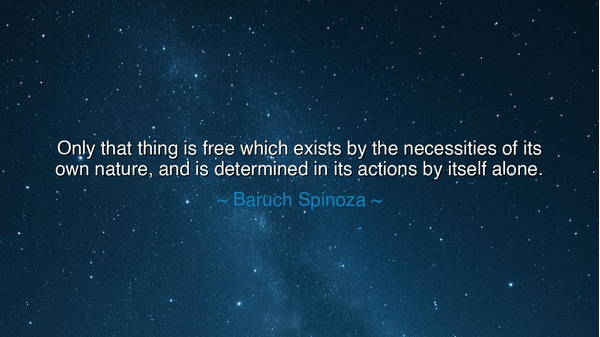
Only that thing is free which exists by the necessities of its
Only that thing is free which exists by the necessities of its own nature, and is determined in its actions by itself alone.






In the noble and luminous words of Baruch Spinoza, philosopher of reason and freedom, he wrote: “Only that thing is free which exists by the necessities of its own nature, and is determined in its actions by itself alone.” This saying, drawn from his masterpiece Ethics (published posthumously in 1677), captures the essence of true freedom, not as mere license to do as one pleases, but as the harmony between one’s nature and one’s actions. To Spinoza, freedom is not rebellion against law or constraint; it is the serene acceptance of the order of being, the realization that one acts freely only when one acts in accordance with the deepest truth of what one is.
When he speaks of that which “exists by the necessities of its own nature,” Spinoza means that freedom is born when a being fulfills its purpose. The stars are free in their orbits, not because they wander aimlessly, but because they follow the laws of the cosmos with perfect obedience. The wise man, likewise, is free not when he rejects reason, but when he lives in full alignment with it. For Spinoza, to be free is to be self-determined, governed not by impulse or external influence, but by understanding. The slave of passion is no freer than the stone that falls under gravity; only the one who acts from the clarity of mind and the love of truth acts from himself.
This idea of freedom through necessity may seem paradoxical to the modern ear. How can one be free if one is bound by necessity? Yet Spinoza, like the ancients before him, understood that the highest liberty is found not in doing whatever one wills, but in willing that which is right. The wolf who follows hunger is not free; the man who follows wisdom is. Freedom is not the absence of restraint but the mastery of self. To exist by one’s own nature is to know that nature — to understand what one was made for, and to move in accord with that purpose. Thus, knowledge is not merely power, as Bacon said, but freedom itself.
Consider the story of Socrates, the Athenian sage. When condemned to death, he was offered the chance to flee. Yet he refused, saying that to escape would betray his principles and the laws of his city. He chose death rather than compromise truth. Was he not the freest of men, though chained? For in that moment, he acted not by fear or compulsion, but by the necessity of his nature — by the moral law that guided his soul. His body was imprisoned, but his spirit stood unshaken. In that calm acceptance of truth, Socrates embodied the Spinozan ideal: one determined by reason and virtue alone.
Spinoza himself lived this truth. Cast out by his community for his radical thought, he refused both wealth and comfort, choosing instead the quiet life of contemplation and the craft of lens-grinding. Though poor and ostracized, he was inwardly free — untouched by the opinions of others. His philosophy flowed from this inner sovereignty. For Spinoza, the man who depends on external approval is enslaved, but the man who rests upon the necessity of truth is unbound. His actions are not reactions to the world, but expressions of his essence.
The lesson, then, is this: freedom begins where dependence ends — not dependence upon others, nor even upon passion, but upon ignorance itself. The path to liberty is the path of understanding. Learn who you are, what your purpose is, and align your actions with that purpose. Do not confuse impulse with freedom; do not mistake rebellion for strength. The one who is ruled by anger, desire, or fear is a captive within his own heart. But the one who understands, who acts from reason, who loves what is eternal — he is free even in chains.
So let this be the teaching for those who seek freedom in a noisy and restless world: freedom is not granted, it is realized. It is not won by conquest but by comprehension. When you act from your deepest understanding, when you are faithful to the truth of your being, no force on earth can enslave you. Like the stars in their courses and the wise in their peace, you will move by the necessity of your nature, not as a servant of the world, but as a creator within it. And then, as Spinoza promised, you will know what it truly means to be free — not the freedom of the body, but the everlasting freedom of the soul.






AAdministratorAdministrator
Welcome, honored guests. Please leave a comment, we will respond soon